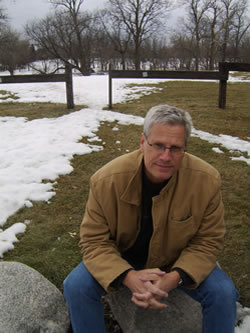|
A young man sits alone in a tree on a late afternoon in winter, darkness coming on. The air is cold, and his fingers are numb. A rifle rests in his lap. As he waits for a chance to shoot a deer, a gunshot echoes from the direction in which his father also sits waiting, and the young man senses immediately that something is wrong.
This is how my novel, Undiscovered Country, begins—and how it began for me, as well, one late afternoon years ago in a Minnesota woods as I sat up in a tree, rifle in my lap, imagining that scene. What sort of story, I asked myself, might it suggest? Who was this boy I'd dreamed up? Who was his father, and what in heaven's name had happened to him? I didn't know. For a long time I didn't know. But the scene remained with me until one day, years later, I felt compelled to put it down on paper. And when I did that, something was jarred loose in my head. What if I used the same premise that Shakespeare used for Hamlet? A young man—sensitive, vulnerable, strong-minded—loses his father, and then worse, is given reason to question the circumstances of his father's death. I wasn't casting about for a mythic plot to appropriate, at least not consciously, but I saw right off that it was perfect, just what I needed.
For me, the act of discovering a story often follows this pattern. An image or scene—some person or situation I happen to observe, or an incident I've heard about—collides in a fascinating way with some other image, scene or idea, and I'm off and running. I don't mean here to make the process sound mystical—and in fact I'll go out on a limb and suggest that I might have been aware, at some level, of how my initial scenario (a boy alone in the dark cold, waiting) is emblematic of Hamlet's situation and state of mind. His predicament, you could say, is the adolescent predicament, crazily magnified. With his father dead and his mother tangled up with the man who has stepped in to take his father's place, Hamlet must do what each of us must do as we move toward adulthood—remake himself in his own image. Every support and mental comfort has been knocked away, and he's forced to discover his deepest reserves of strength. He is stripped bare, the moorings of his psyche exposed.
If I'm ever tempted to feel defensive about the borrowing I've done, and on occasion I am, I resort to saying, Hey, Shakespeare did it too—he was using older sources for his work. But the fact is, it wasn't my intention to tell that story again. Instead I wanted to search out its mainspring, wind it up, and put it to the test. I wanted to find out if a character who issues from my mind—a young man who is the product of a place and culture I know—would, if faced with the dilemma Hamlet faced, make decisions similar to the ones Hamlet made. I didn't know how my novel was going to turn out until I wrote through to the end of it. And I can't say that it ends as I would have liked it to end—because it ends as it must end, given who my characters are and who they become along the way. Character, after all, is the beating heart of fiction, and writers need to employ whatever plot will allow them to mine the potential of their characters in a way that's convincing and authentic.
As young writers we were urged to write what we know—good advice, if it means that we should locate our stories in a tangible world we can feel and breathe and move through, populate them with people as complicated as those we love or joust with, and dramatize them with situations taken from the nuances and trappings of a culture we understand. Plot is artificial, the imposition of an order rarely found in real life. Plot we make up or piece together from other plots. What other choices do we have? But the smell of the air when a storm is coming, the way a train whistle carries in the rain, the difference between a lever-action and a bolt-action rifle, the change in a child's voice when frightened—these things have got to be right. And it's through these details, as they are filtered through our experiences in the world, that a story unfolds.
Once I'd gotten started on my novel, once I'd immersed myself in the place I'd created—a small town perched on the edge of a large lake in the heart of Minnesota's vast north woods—it was a matter of finding for each character and situation, not the essence of Shakespeare's vision, but the part of myself and my own experience that I could offer them. In some respects Jesse Matson, my seventeen-year-old protagonist, is similar to his literary precursor. He shares Hamlet's intensity and unblinking pursuit of truth, but not his tormented melancholy. Like Hamlet he learns to doubt the allegiance of friends, yet he has no wish to banish his beautiful but troubled girlfriend to a nunnery or anywhere else. His father is a mayor and restaurateur, not a king. His mother is a singer, a disappointed actress, not a queen. And while there is something rotten in the small town of Battlepoint, Jesse Matson's attempts to root it out are his alone.
|


